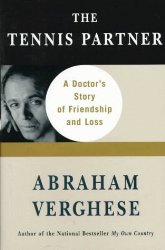$25.00
$17.27
(SAVE Now!)
as of 12/22/2024 (Details)
In My Own Country, named one of the five best books of 1994 by Time magazine, Abraham Verghese ventured into the valley of the Smokey Mountains, where he bore witness to the arrival of AIDS in a town that had never expected the disease or its terrible consequences. The New York Times Book Review called the book "an account of the plague years in America, beautifully written, fascinating and tragic, by a doctor who was shaped and changed by his patients." As an African-born Indian, Dr. Verghese revealed something essential about our American soul, reminding us, said Washington Post Book World "of what is honorable and charitable in the way humans behave toward each other." My Own Country presents an unflinching portrait of men and women facing the prospect of premature death, yet sometimes learning for the first time in that bleak circumstance how it is to live. In 1991, Verghese moved west, bringing his wife and two young sons to the boarder town of El Paso, Texas. There he crossed paths with David Smith, a medical student who came to America from Australia on a tennis scholarship and played briefly on the pro tour before deciding to become a doctor. Recognizing some spark of commonality--perhaps just that of two strangers on the very edge of America--Verghese cajoled him into playing tennis again. On the wards, Verghese is teacher and mentor as he guides David through difficult and sometime colorful clinic problems seen in a country hospital. He teaches him how to read the signs from the human body, to use his hands to percuss, and to use his mind to listen. On the tennis court, their roles are reversed: The clinician becomes the student--almost. David helps Verghese hone his strokes and sharpen his game. But Verghese, a compulsive collector since childhood of tennis lore and trivia, a compiler of notebooks on tennis heroes, ephemeral styles, and trendy strategies, rekindles David's love of the game, a love burnt out by the brutal competitiveness of the professional circuit. Perhaps this is how friendship between men are born: art work and at play. When the two men test their newfound bond, their friendship becomes something quite remarkable. Verghese confesses that his marriage is failing--and David admits that he is a recovering intravenous cocaine addict, struggling mightily to hold on to his girlfriend, his career, his sobriety. Against the stubborn, unyielding backdrop of the desert, their relationship grows increasingly rich and complex, more intimate than two men usually allow. Whether they are cycling on Old Mesilla, seeing a critically ill patient, or commiserating about a failed romance, each anticipates the other's needs, is there to buttress a fall, or to celebrate the small victories: David's graduation, Verghese's son's birthdays. Just when it seems that nothing can go wrong, that friendship will be able to conquer all, the dark beast from David's past emerges once again. As Verghese scrambles to rescue him, David proves that he is friend to everyone but himself. When David spirals out of control, almost everything Verghese has come to trust and believe in is threatened. It is a defining moment, the kind each of us must eventually face--it is from such adversity that our lives are carved. The Tennis Partner is a remarkable journey to the ends and the edges of friendship, to its heights of intimacy and clarity, and also to its hellish depths of deception and betrayal. It is, above all, an unforgettable, illuminating story of how men live, and how they survive.
Technical Details
No features available.